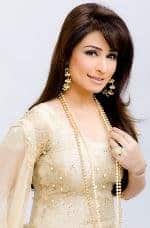Pakistani drama Actress Arjumand Rahim

Arjumand is a talented TV and stage artist, with equal dedication to on and off screen work. She is a film maker as well as actor, with a passion for creating imaginative and original works that viewers and critics alike can enjoy.In the year 1995, Pakistani drama actress Arjumand Rahim started off her career with Urdu Theatre production. The feedback she received was remarkable that is the reason why she thought of pursuing in the media. The inspiration of acting is what that stays with her all time even when she was not in the field professionally. The reason is that she was the head of the dramatics society when she was studying.
Theatre is first love for Arjumand Rahim
Pakistani drama actress Arjumand Rahim prefers theatre over TV but she accepts that it’s TV that is giving her financial stability and allowing her to stick to the career.
“Theatre is my first love and the medium I prefer to work for…”
After coming back from Mumbai, she is doing theatre and she feels alive and loves to work for it. A big no-no for television by Pakistani drama actress Arjumand side. She was not interested although she has got a number of good offers not only in Pakistan but for commercial Indian films.
Acting Projects Liked by Pakistani drama actress Arjumand Rahim
Participation of Pakistani drama actress Arjumand Rahim in Kara Film Festival
Pakistani drama actress Arjumand Rahim enjoyed “Corrie Bratter” role in “Barefoot in the park”. The play was staged in 1997 and production by Karachi Circle Production. “Neeli Dhoop” is another project which she liked. It was written by Bushra Ansari and In fact, it was the first play from Bushra Ansari which got on aired in 1998 on PTV World. She has made several films for Kara Film Festival of Karachi, Lahore, and Islamabad. “Shahrukh Khan ki maut” was her first film in the festival and gain good response.
Pakistani drama actress Arjumand Rahim is multi-talented actress of Pakistan as she not only experimented in acting but also produced number of films. Also, got offers from India but she refused and is more inclined towards production side. Moreover, Pakistani drama actress Arjumand Rahim owns a production house “Art Republick” and has a team of hardworking professionals. Through her production house, she is trying to produce plays and films which can stand at par with international standards.
Hard work and dedication are what define the multi-talented actress-turned-producer, Arjumand Rahim. During the past two years, Arjumand had performed in few TV plays.
The news was that she was in and out of the country, exploring opportunities in Mumbai, India. Since her return, Arjumand’s prime focus remains her commitments with Art Republik, a production house that she has launched.
Meeting the stylish actor has always been a pleasure. Our rendezvous took place in her office while she was enjoying a plate of spicy nihari. My first question to her was about her Mumbai experience.
I went to India because I wasn’t very excited about my work here or the kind of roles that were being offered to me. In fact, it’s not about the roles but more about the treatmentof the character by the director that makes a world of a difference.
The truth is that very few directors work in Pakistan meets international standards. The quality of script has also deteriorated over the years and the influx of channels has led to a compromise on quality programming.
Finding the right wavelength with your co-actors and crew has also become extremely hard. In such a scenario, Mumbai presented an exciting option to rejuvenate my soul as well as to explore different avenues. Luckily, the experience turned out to be rewarding, she says.
Once there, Arjumand went back to her roots, doing theatre which, according to her, made her feel alive. However, television was a big no-no. I got a lot of television offers, none of which seemed exciting enough to pursue.
I don’t rate Indian TV serials and soaps very highly, and I certainly wouldn’t give preference to them over the Pakistani ones. But what I do appreciate in the Indian entertainment industry are the films, and preferably those that fall in the alternative/crossover category.
Arjumand says she received offers for several commercial films in India, all of which she turned down. The reason being her reluctance to be launched as a sex symbol. It just did not feel right to accept those offers. Naturally, I’d prefer to be noticed as an actor rather than for attributes that don’t necessarily require any efforts at my end.
After watching films like Mr & Mrs Iyer, Monsoon Wedding, etc, I was very open to offers from the parallel cinema, which provides a wider creative margin. Unfortunately, I couldn’t complete eitherof the two films I signed there. The first was an English film that kept getting delayed due to financial problems.
Then the cast changed that initially comprised Tabu, Rahul Bose and myself in the lead roles. My character was very powerful and part of a love triangle, but when Tabu backed out and uncertainty continued to hang over the project, my confidence was shaken.
Koel Puri was taken as a replacement for Tabu and when we converged for a script-reading, I discovered that the script had also undergone major changes with the result that my character was now more like a sexy vamp. I just felt like not taking such a risk in the first film of my career and without having complete faith inthe director and character, she says.
However, she continued with theatre and did a project for Channel [V] as a dancer. Then she was offered a Hindi movie called Khajoor with Amir Bashir as a hero (second lead in Armaan). It was a light-hearted romantic film set around a non-stereotypical, educated Muslim family in Lucknow.
Supriya Pathak was cast as her mother, Raghuveer Yadav as grandfather and Daya Shankar Pandey as a faithful house servant. Though the film had a fine cast and script, Arjumand could not complete the project as her visa limit expired.
Once back on home turf, Arjumand started working for television and felt that now is the right time to invest and devote her full time to her profession. Hence ArtRepublik came into being.
I went to India because I wasn’t very excited about my work here or the kind of roles that were being offered to me. Mumbai presented an exciting option to rejuvenate my soul as well as to explore different avenues, says Arjumand Rahim
With the boom in media and demand for better quality software it just made sense to jump into the fray instead of sitting on the fence and being at the mercy of people one complains about. Currently, what is giving me hope is that channels are rejecting B-grade, shoddy software despite their need for projects to air and fill the time slots.
A sense of quality consciousness has crept in which suits people like me just fine who choose to be in this field so that we can express ourselves through our creative talent. Like I keep saying, there’ll always be a market for truth, she says.
So what is the philosophy behind Art Republik? Being a secular person, I am keen to see my generation living out Jinnah’s dream of Pakistan being a tolerant secular country where there are opportunities and rights for everybody as long as they are committed and sincere. Religion and diverse socio-economic and cultural backgrounds shouldn’t hamper development as a thinking and contributing member of society.
I also feel that diversity adds freshness and brings value to the creative process. The idea with regard to Art Republik is that if you are a thinking person and have the talent to express yourself, you are sincere. And if you are willing to work hard there will always be an opportunity for you here. ArtRepublik is geared towards creative and interesting work, anything that’s evocative and original.
True to its motto, Art Republik is working on interesting and varied programmes from a music show titled Taxi and a 52-episode drama serial, Dil Ki Madham Boliyan, as well as a series of telefilms called Paristar. As a matter of fact, the first film in this series, Shah Rukh Khan Ki Maut, was screened at the recent Kara Film Festival and is based on a boy’s (Murad) innocent dream and how his soul is hurt when his dream is shattered.
The main theme was a child’s adulation for his idol, Shah Rukh Khan in this case was a very relevant choice as he has come to represent all that is synonymous with success. Let’s face the reality that Bollywood stars do have this kind of impact onPakistani audience. But the film is not about Bollywood but about Murad and his dreams. I was pleased that many viewers from the intelligent audience at Kara picked up the underlying theme of child labour in the film as well, says Rahim.
Still, with a novel storyline, good production values and huge acclaim, the film didn’t win any award at the festival. We never started out by knowing or thinking that the film could ever be in the running for any kind of award. We didn’t even know what to do with it sell it to a channel or make it a teleplay or a single film. We just had a sensitive storyline whichthe director, Ehtesham, came up with.
He wrote a powerful script and that propelled the entire creative team to work harder and support him to the best of their abilities. Once complete, we thought why not send it to Kara. The Kara Film jury and the selection committee responded very warmly and I am very flattered by the comments received so far.
SRK Ki Maut eventually competed with international films shot on 35mm and made with budgets that we can’t even afford to imagine. To compete in the foreign film category is enough for me, and to be considered worthy of best film award is an acknowledgement in itself, she says.
Another project Arjumand is excited about is Dil Ki Madham Boliyan, based on a true story written by Mohammad Ahmed and directed by Saife Hasan, creative director at Art Republik.
I wanted to do something which is long running but not necessarily along the lines of a soap. Today, we are adopting the readily available formula of Indian soaps where there is high gloss, glamour, beautiful women and unrealistic portrayals of characters.Pakistani TV viewers enjoy Indian soaps because we are not giving them the quality in dramas that was once our hallmark. Dil Ki Madham Boliyan is the true story of a girl who lives in Karachi and is distinctly related to the writer.
In short, the characters are very original, the dialogue powerful and the acting style is natural. An average Pakistani viewer can easily relate to the story and that will be our strength in attracting Urdu/Hindi-speaking audiences from around the world. It has its share of glamour where the situation demands it but simultaneously we’ve made a conscious effort to enact what we see and experience in daily lives, she says.
Arjumand’s aspirations run high for Art Republik and she sees the company venturing out into the medium of films. I am fascinated by films and want to translate my ideas on to a wider canvas. Art Republik will branch out or at least a section of it will become film-oriented. I not only want to make and distribute films, but also wish to undertake joint productions with other countries interested in working in Pakistan. Film is a powerful tool for getting one’s point of view across in a poetic way.
It seems that Arjumand has changed gear. I ask her whether she is still open to acting. Acting is there and I am very much open to new projects. As an actor one is just part of a larger process but as a producer the scale of the responsibility is much higher. Despite the stress, I must admit I am thoroughly enjoying the new avatar. It has brought stability to my life.
Being a hyper person I need to work or I begin to get depressed. My work as a producer has also given me the option of not doing the kind of work that I don’t want to do as an actor.
Last year I hardly acted in any play. I have just done three serials and a theatre play with Sania Saeed and Shahid Shafaat, which are more than enough to quench the thirst of the actor in me.
Another Interview
How would you introduce yourself to our readers – as a person as well as a media professional?
Well, I am a curious person and fairly open to new experiences and situations. I enjoy traveling and meeting new people and yet, I also have a strong homing instinct and enjoy being with my mother and dogs at home when I am not working. As a media person, I’d describe myself as lucky and someone who’s consistently happened to be at the right place at the right time. I’ve been fortunate enough to partake of opportunities that came my way without too much active pursuit. I think that’s also why my sense of humor is available to me in the workplace and it’s perhaps easier for me to continue taking risks and thinking out of the box.
When did you start your acting career and what was the inspiration?
I started acting in 1995 with an Urdu theatre production. The positive feedback I received encouraged me to believe in myself and follow my heart despite the pressure of getting into an unstable profession. The inspiration was always there since acting is something I’d been doing all my life, throughout school and college. Theatre is still my first love and the medium I prefer over television but it’s TV that’s given me financial stability and allowed me to stick to my career choice in terms of acceptability and popularity.
Which of your acting projects do you like the most and why?
As I mentioned earlier, it’s theatre and therefore stage plays that have given me the most satisfaction intrinsically. I particularly enjoyed playing ‘Corrie Bratter’ in “Barefoot in the Park” which was a play we staged in 1997. This was a Karachi Drama Circle Production. Another memorable project is a tele-film titled “Neeli Dhoop” which aired on PTV World in 1998. It was Bushra Ansari’s first TV script and directed by her husband Iqbal Ansari. Neeli Dhoop was an emotionally charged experience and drove me to dig deeper within myself to discover real pain. I enjoyed the project as it challenged my skills and I got to work with a very exacting director.
You are also involved with film production – what can you tell us about your focus and interests in this area?
Film is an area I am not only passionate about but also trained in, and therefore one of the few trained professionals in Pakistan. It’s a large and effective canvas with tremendous power and impact when used aptly. So far, owing to restricted budgets I’ve only worked on the digital format in Pakistan but tried to work with subjects most producers wouldn’t touch due to their sensitive nature or lack of financial viability. I, however, believe that if you are honest and make a good film it’ll sell despite its pre-supposed outcome. There will always be a market for truth; one just must have the guts to tell it. With my first film “Shahrukh Khan Ki Maut”, we’ve already had showings to packed audiences during the Kara Film Festival in Karachi, Lahore and Islamabad. Recently the film was entered in the 3rd Eye South Asian Film Festival in Bombay and now it’s also going to be screened at the upcoming Dubai International Film Festival in December 2006. Our second film is going to be world premiered in Kara this year. There are definite plans to cross over into the international market with our indigenous stories as I feel the international world is interested in our region. It is our responsibility now to show them what our country and people are about.
As an actor, what type of roles do you want to play?
Anything that’s well thought out and mapped with sensitivity and care. Anything that’s evocative. As an actor, it’s my job to bring the writer’s imagination to life.
You spent some time in Bollywood, working on a couple of film projects. How was the experience?
Well, it’s true that I signed two films during my stint in Bombay but due to different reasons I couldn’t complete either project. Upon hindsight, I am glad it didn’t work out and my decisions, which seemed rash at the time, make a lot of sense today and have swung in my favor! I did act in theatre while I was there and my experience was wonderful. I found the process more professional, and the people more committed to their chosen professions.
Arjumand Rahim Pictures
|
|
|
| ||||||||
|
|
|













